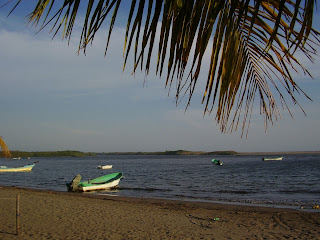So I´m now staying with doctors Aurora and Andr
és. Andr
és explained he has a small farm/piece of land. It´s full of indigenous trees and is all organic. He likes to go there on Saturdays and exchange his surgeon´s scalpel for a machete. We saw the following trees; mango, coffee (the beans taste fruity), bamboo, cedar (very weedy looking), banana and plantain and others...
He´s holding a cashew and cut it very neatly. The nut grows at the bottom of the fruit that he´s about to cut. I then sucked the fruit, which is sort of like mango but with a distinctive flavour. The juices stain, so I had to lean forward in a most inelegant way and still got messy. Good thing I had some wet wipes... Andrés gave me the nut to take home and plant.
Had I known when I got dressed this morning that I would be picking cashews, I would have worn a top that didn´t clash. But who could have forseen this?
A chocolate tree. How could I not be happy here?
This is what the cocoa looks like. There are lots of seeds, each about the size of a broad bean. I sucked one and it tasted fruity, quite like lychee. The inner bit is dried and then cracked open to remove the seed. They use it to make some sort of drink. I supect it´s not like Cadbury´s drinking chocolate - which is unthinkable in this heat. The ones we sucked have been planted in a small bed at home and once they start to grow as trees, they´ll be planted in the wood.
This is the cocoa, growing directly on the trunk of the tree and it comes from those tiny wee flowers.
Andres´ son "fishing" for mangoes with a net on the end of that pole.










